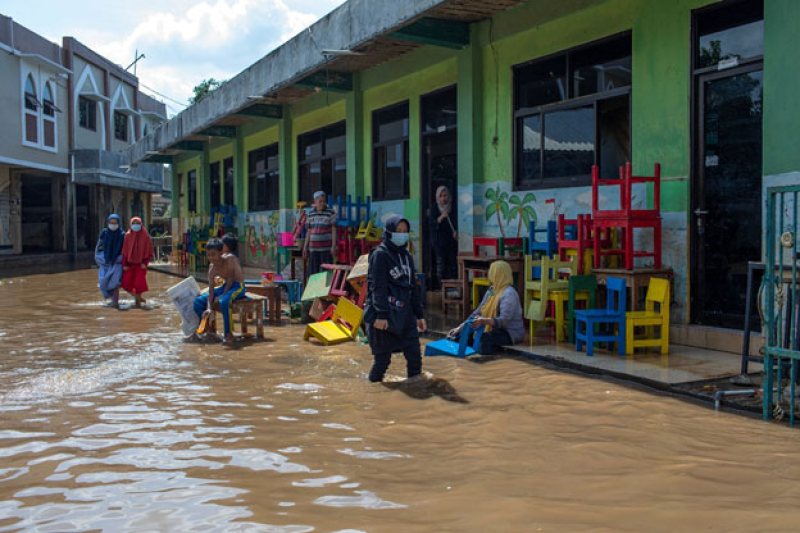- U.S. Embassy Dhaka Welcomes Ambassador-Designate Brent T. Christensen |
- Survey Shows Tight Race Between BNP and Jamaat-e-Islami |
- Yunus Urges Lasting Reforms to End Vote Rigging |
- Govt Cuts ADP to Tk2 Lakh Crore Amid Fiscal Pressure |
- Home Adviser Urges Ansar Professionalism for Fair Polls |
Strong CRVS Systems Key to Disaster Resilience

Residents clean the mud off seats and chairs belonging to a kindergarten school in East Jakarta, Indonesia. Data from CRVS is vital for post-disaster recovery and essential to mitigate long-term climate impacts.
As climate change intensifies, disasters such as hurricanes, floods, droughts and wildfires are becoming more frequent and devastating. Rising sea levels further threaten coastal communities, putting millions at risk. Strengthening disaster preparedness and resilience is now essential to protect lives and reduce long-term climate impacts.
When disasters strike, accurate data is crucial for effective response and recovery. A major impact is population displacement, as disasters—both sudden and slow-onset—can render areas unsafe or uninhabitable. When homes are destroyed, livestock lost, crops fail, or local economies collapse, relocation often becomes necessary. Health risks and resource shortages add further pressure, forcing many into displacement.
Despite this growing trend, many displaced people remain invisible in official records, making it difficult to measure the true impact and hindering evidence-based responses. Similarly, disaster-related deaths often go underreported, with the real toll discovered much later, if at all.
Displaced populations frequently require proof of legal identity to access essential services. Civil registration and vital statistics (CRVS) systems ensure the permanent recording of key events—births, deaths and marriages—while issuing documents and compiling statistics. Strengthening these systems is critical for ensuring displaced individuals are counted and disaster-related deaths are properly recorded.
A strong CRVS system is essential for disaster management, enabling authorities to identify affected populations, coordinate aid and support family reunification. Linking CRVS with other data sources can further improve assistance to those impacted. Reliable cause-of-death data also distinguishes direct disaster casualties from indirect ones due to disrupted healthcare, malnutrition or unsafe living conditions—insight crucial for targeted policy and recovery efforts.
However, disasters can disrupt CRVS systems. Damaged infrastructure, mass displacement and restricted access to services make it harder for people to maintain or restore identity documents—precisely when they need them most. Without these, individuals may struggle to access aid, healthcare or family reunification. Resilient CRVS systems, especially digitalised ones, help ensure vital events are recorded even during crises, supporting faster and more inclusive recovery.
Integrating CRVS systems with disaster response mechanisms enables better support for displaced populations, ensuring access to aid and safeguarding legal identity. Opportunities include harmonising records with disaster databases, including hard-to-reach groups, tracking displacement over time, and aligning CRVS with national and regional statistics.
Governments and partners are urged to strengthen CRVS systems by integrating them with early warning and displacement monitoring tools, and by formally recognising disaster-induced displacement. This shift from reactive management to inclusive preparedness ensures no one is left behind.
At the Third Ministerial Conference on CRVS in Asia and the Pacific, participants adopted the Ministerial Declaration on a Decade of Action for Inclusive and Resilient CRVS, reaffirming their commitment to resilient systems as a foundation for legal identity for all.
Strong CRVS systems safeguard identity, dignity and access to services during crises. By ensuring vital events are recorded, countries can protect the most vulnerable and accelerate recovery. As climate-related disasters become more frequent and severe, investment in resilient CRVS systems is more important than ever—because resilience begins with being counted.

